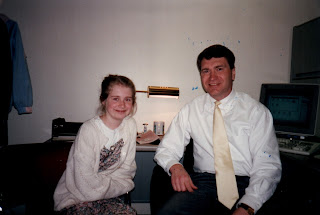Playing the Odds
Those kids, the ones who dream of becoming professional athletes, Hollywood stars, or high-ranking politicians, will inevitably have their ambitions knocked down a few pegs as they grow older and wiser in the ways of the world. At some point, a well-meaning adult will say to them, "You know, it's very unlikely that you'll get to the NBA. Most people don't. It's great to dream, but maybe you should have a backup plan. Something more practical, like accounting." And that's the moment that those dreams begin to fade away, replaced by more realistic ones.
As a kid, my dream was to become a published author. Somewhere along the way, that dream was deemed unrealistic. "You like reading and writing," someone told me (or maybe the world told me, or maybe I even told myself), "Why not become an English teacher?" And so I did, because it was the realistic thing to do. The safe thing. The thing that the world expected of me.
I've always considered myself a realist. Back in our high school years, my best friend Anique and I were a the perfect complement to each other in this way -- the yin to each others' yang, if you will. She was the dreamer, the eternal optimist, and I was the sensible one, feet firmly rooted to the ground. My job was to bring her back down to earth when she began to fly too close to the sun, and her job was to challenge me to consider possibilities beyond the mundane, to imagine more for my life than I dared to. Without a doubt, her influence helped me to put myself out there in ways that I wouldn't have otherwise. She was the one who convinced me that I was a talented singer, who encouraged me to audition for the school musicals, which ended up being my sort of "claim to fame" back in those years and inevitably boosted my confidence in ways that spilled over into other areas of my life.
But still, when it came time to choose a college major, the pragmatic side of me prevailed, as it is wont to do. Because who makes their way out into the world and brazenly says, "I'm going to be a writer"? Certainly not me, I decided back then. Even if writing was in me, even if it was all I'd ever really wanted to do with my life, it wasn't a career path. Not a realistic one, anyway. And I was nothing if not realistic.
Something funny happens when you get into your late thirties, though. Those deepest things that define you, the dreams you kept buried for fear that they wouldn't -- couldn't -- come true, have a way of forcing themselves up to the surface, of compelling you to acknowledge them, of screaming in your ear until you finally pay attention. Writer and motivational guru Brene Brown describes this phenomenon better than I ever could:
People may call what happens at midlife 'a crisis.' But it's not. It's an unraveling -- a time when you feel a desperate pull to live the life you want to live, not the one you're 'supposed' to live. The unravelling is a time when you are challenged by the universe to let go of who you think you are supposed to be and embrace who you are. (Brene Brown)
The problem with having a dream of becoming a published author, though, is that you have to play the odds -- and right out of the starting gate, the odds are not in your favor. Much like those kids who hope to one day pitch for the Red Sox, or have a desk in the Oval Office, or have a star on the Hollywood Walk of Fame, those publishing hopefuls are bound to have their ambitions met with the pinched, sympathetic half-smiles of friends and family who don't really believe that it's possible. And let's face it -- for many aspiring writers, it's not. I've read a variety of articles on the topic, and lots of statistics are thrown around, but most likely somewhere around 1 for every 100 people who writes a novel will actually be successful in having it published commercially. And even those who are successful often face years of hard work and disappointment before they get there; even New York Times bestselling authors often received a disheartening number of rejection letters from agents before finally selling their novel. This journey, I've been told, is not for the faint of heart, and the challenges of actually writing the book are only the very beginning.
Why does our approaching midlife bring us this "desperate pull," as Brene puts it, to consider these remote possibilities for ourselves? Surely our younger selves, the versions of us that first pushed aside these big dreams in favor of more reachable ones, are actually the wise ones. After all, they did it to protect us from the hurt and disappointment that comes with failure. It's true -- as twenty-somethings, we probably were wise to take the path of least resistance. We weren't ready yet for what Brene calls "the arena," the place where you go to tackle your truths head-on. But now, as we get older, we've experienced enough failure (even on our "safe" paths) to know that it's okay -- we've been through it and we've survived it, and we've come out of it stronger. So why not take a deep dive into what we really want out of life, play the odds, give it all we've got and see what happens? As Wayne Gretsky said, "You miss 100 percent of the shots you don't take." Life is too short not to give those big, scary dreams your best shot.



I love that Brene Brown quote...and it's so true! I am excited to watch you go along this journey and wish you the best of luck!
ReplyDelete